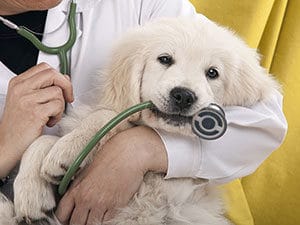
Congratulations, you’re a proud new dog owner, and your little bundle of joy is ridiculously cute! Now comes the hard part: learning how to care for a puppy.
If you’ve cared for a dog before, you might think that you already know everything there is to know, but newborn puppies are a bit different. You need to be prepared if you want to help your new friend through the first few weeks of her life.
Here are 5 tips to help both of you survive intact and come out on the other side happy and healthy.
Feeding a Newborn Puppy
Just like with human babies, the mother’s milk contains everything that the newborn needs to survive and grow for the first four weeks. But if mom isn’t around or can’t do it, you need to use a commercial canine milk replacer that has been specifically designed for newborns.
This is incredibly important, because some milk replacers — including cow’s milk — can cause diarrhea. Consult with a vet as soon as possible about how to bottle-feed your pup correctly, because you can hurt her if you do it wrong.
You’ll need to provide these feedings every few hours for the first few weeks. After about a month, you can start transitioning puppies to solid foods by adding water and milk replacer to dry kibble and blending until it reaches the consistency of oatmeal. You can slowly reduce the amount of water and milk replacer you add over the next month until they are able to eat plain kibble at around 7 to 8 weeks.
Keeping Them Warm
Newborn puppies can quickly and easily die of hypothermia if they aren’t kept warm enough. If the mother is there, simply lying next to her should provide enough heat, but if you’re acting as surrogate mother, you’ll need a bit more.
Blankets can help, as can heating pads, but take care that you don’t use something that’s too warm or can burn them. For specific advice, talk to your vet.
Helping a New Puppy Go to the Bathroom
Did you know that newborn puppies can’t go on their own? Mother dogs have to help them to urinate and defecate by licking the appropriate areas after the puppies eat.
If no mother dog is around, you’ll need to do this by massaging their urinary and anal regions with a soft cloth that has been dipped in warm water. A vet can show you the proper way to do this until your puppy is able to go on her own at about a month old. Then you’ll have to start worrying about house training!
The First Vet Appointment
A big part of caring for your newborn puppy is ensuring he gets the help he needs when he needs it. And as already mentioned, your vet can help train you how to properly feed and assist with elimination. There are a number of reasons why you might need to call your vet immediately about your puppy. If he’s vomiting, coughing, crying nonstop, has nasal discharge, can’t go to the bathroom with help, experiences diarrhea, or just isn’t eating or gaining weight, you need to see a professional as soon as possible.
However, if your puppy seems healthy, most vets won’t need to see them until they reach six weeks of age. At that point, you can begin the first round of standard vaccinations and deworming.
Training and Socialization: What and When?
You might want to crate train your newborn, but it’s not going to do you any good until they’re about 7 to 8 weeks old, can eat solid food, and go to the bathroom on their own. Introduce it to them in the most friendly way possible, offering treats or toys when they go into the crate, and only closing it for a few minutes at a time.
Other kinds of simple training and socialization can begin within the first few weeks, such as you handling the puppy and calling her to you once she begins to explore. You want her to bond with you and get used to your smell, voice, and touch.
It’s also a good idea to introduce others to your new pup around this time. But as she approaches eight weeks, you need to handle socialization carefully, because all puppies go through a “fear” stage. Negative experiences during this time can be incredibly impactful. Take it slow, and follow your puppy’s cues.
Have you ever cared for a newborn puppy? Share your experience with us in the comment.











